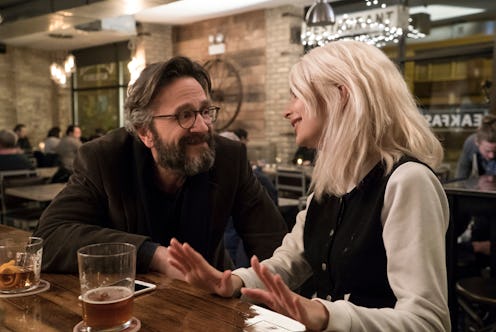
If you’re a millennial like I am, you’re probably tired of the umpteen think-pieces written every week that blame millennials for oversharing, caring too much, caring too little, embracing hook-up culture, not having sex at all, etc. It’s seriously exhausting, and no one likes to be painted with such broad strokes — especially not an entire generation. But millennials do get a little bit of comeuppance in Episodes 5 of Joe Swanberg’s new Netflix series, Easy , entitled “Art and Life.” The series explores love and sex and relationships in the modern age. This episode in particular addresses millennial culture, and why we're not so bad after all. Episode 5 spoilers ahead.
Jacob Malco (played by Marc Maron) is an artist that has made his fortune and name drawing graphic novels — he pulls directly from his relationships and his private life for their content, and, in the episode, we see that not everyone he dates wants to be involved with that. Jacob’s private life is public, but the lives of the women he dates are private, and most want to keep it that way and not worry that a decade later they’ll be the subject of a book. After meeting grad student Alison (Emily Ratajowski) at a reading, Jacob and Alison and her grad school peers talk about art — Jacob is pretty insistent that taking a photo with a selfie stick is not art, and then he sleeps with Alison after everyone leaves. This is where it gets good.
It’s clear that Jacob doesn’t feel much for millennials — in a later rant, Jacob basically calls all milennials selfish and talentless and worse — and when Alison uses a selfie that she took of herself and a sleeping Jacob after their encounter, Jacob loses it, because she photographed a private moment and used it for her art without his permission. Hm, kind of sounds like when Jacob writes about and illustrates all of his exes in his books, doesn’t it?
It’s human nature to share — how much so depends on the person, but for those who seek to expose every facet of his or her life, the iPhone and VSCO cam are how it’s done today. Swanberg is in his mid-30s, which is on the older side for a millennial, but I think he’s making a real statement about his own work here, too. He’s directed movies about unsure young people for years, Happy Christmas and Drinking Buddies among them.
In flipping his narrative, Swanberg forces Jacob (and hopefully, the audience) to realize that millennials aren’t listless or talentless — in fact, they’re doing the same sort of oversharing that humans have done for thousands of years. The fact that it’s done through the Internet doesn’t make it any different. Alison has just chosen a more modern medium with which to reflect her life. It’s the same as keeping a Livejournal, a diary (and then publishing it), and autobiographical play, or anything else that pulls directly from an artist’s life and goes on display. Even smoke signals.
In the end, Jacob realizes that he and the generational group he seems to despise are much closer kin than he originally thought. Interesting how being put on the other side is usually a catalyst for major change, huh?
Images: Scott Garfield/Netflix (3)